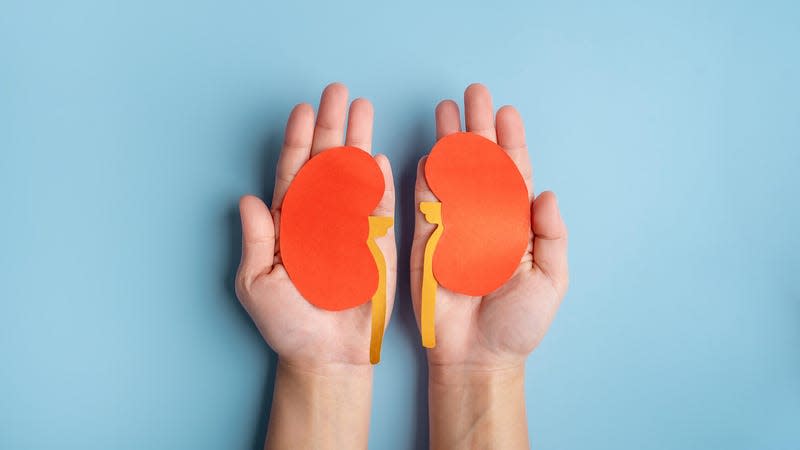An Experimental Antibody Could Someday Make Organ Transplants Less of a Hassle

A person holding paper cut-outs in the shape of human kidneys.
A lab-made antibody could one day make organ transplants less of an ordeal, recent research suggests. In experiments with nonhuman primates, the antibody appeared to be safe and effective at preventing the rejection of transplanted kidneys and pancreatic cells. Scientists hope that this treatment could reduce or even eliminate the need for lifelong anti-rejection drugs with certain kinds of transplants.
The antibody is named tegoprubart, also formerly known as AT-1501. It’s an experimental drug that was initially developed as a potential treatment for amyotrophic lateral sclerosis, or ALS. It was created by researchers from the ALS Therapy Development Institute (ALS TDI), a nonprofit biotech, and is now being developed through a partnership with the company Eledon Pharmaceuticals, Inc.
Read more
United Airlines Flight Depressurizes And Drops 28,000 Feet In Ten Minutes
Final Fantasy VII Rebirth Won’t Let Players Import Saves From The Last Game
Sopranos star Drea de Matteo says ended up on OnlyFans because she wouldn't get vaxxed
Lauren Boebert Caught on Video Vaping at ‘Beetlejuice’ After Staunch Denials
LeBron James, wife and 2 associates named in federal PED investigation
Another key finding was the lack of clotting issues seen after treatment. That’s a side effect that was seen with an older experimental antibody—one that led to unexpected safety issues and possibly even some deaths in early human trials. The subsequent fallout has set back the clinical development of these antibodies as a treatment for transplantation for decades, but it appears that scientists might have finally found a truly safe version of this drug class.
“These data support AT-1501 as a safe and effective agent to promote both islet and kidney transplant survival and function and allow us to advance into clinical trials right away,” said study author Allan Kirk, chair of the Department of Surgery at Duke, in a statement from the university. “This less toxic approach has been pursued for over 20 years, and I think we are finally at a turning point. This could be a great advance for people in need of organ transplants.”
Eledon Pharmaceuticals has already started to conduct small human trials of tegoprubart for transplant patients. Earlier this April, they reported the initial results of its Phase Ib study, which found no acute rejection or related safety issues in a group of 12 patients given kidney transplants. In addition to ALS and organ transplantation, the drug is also being studied as a treatment for Berger’s disease, an autoimmune condition that damages the kidneys.
More from Gizmodo
Lawsuit Against Dealer That Allegedly Misstated Ford F-250 Engine Warranty To Move Forward
He couldn’t afford to sue DC Comics, so Bill Willingham put Fables in the public domain
Tesla's Carmaking 'Breakthrough' Also Comes With Plenty Of Downsides
Sign up for Gizmodo's Newsletter. For the latest news, Facebook, Twitter and Instagram.

